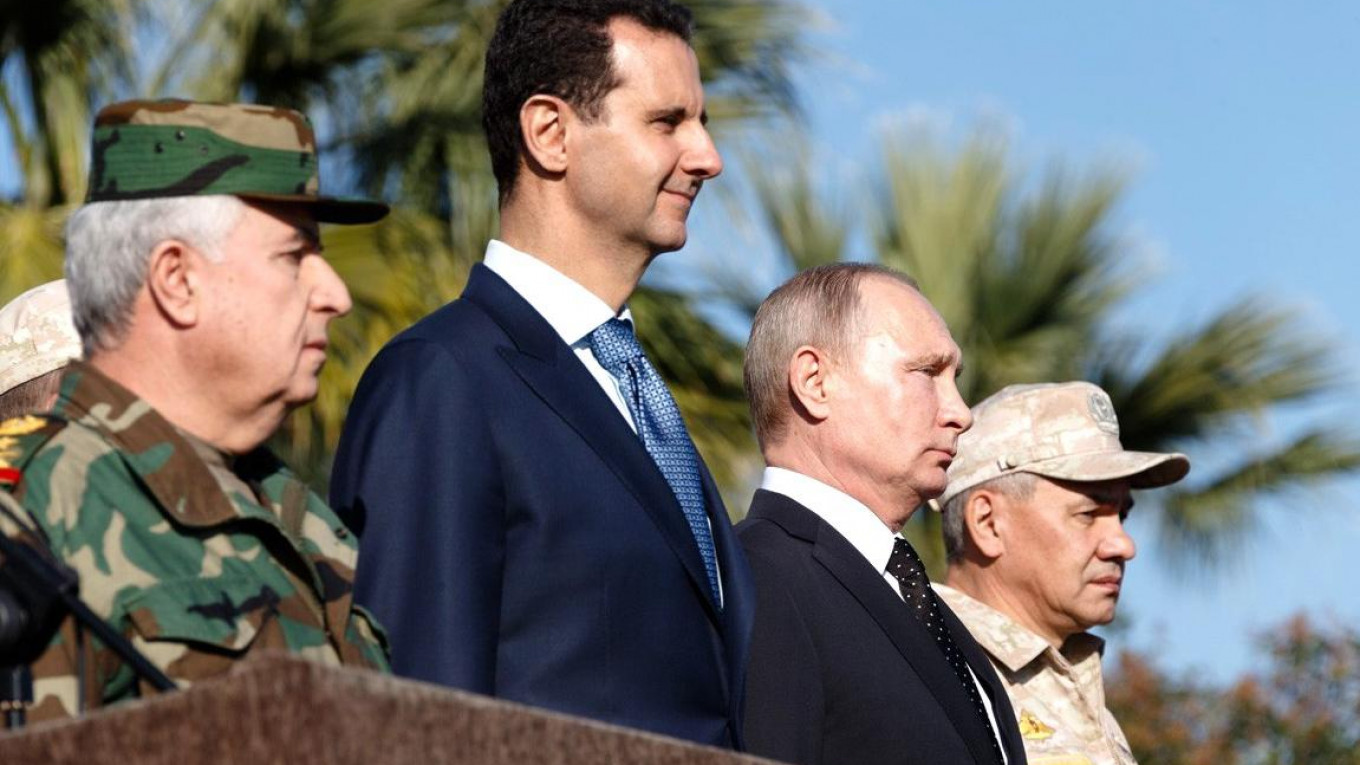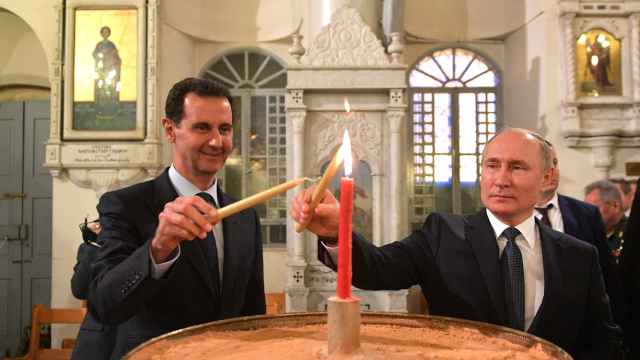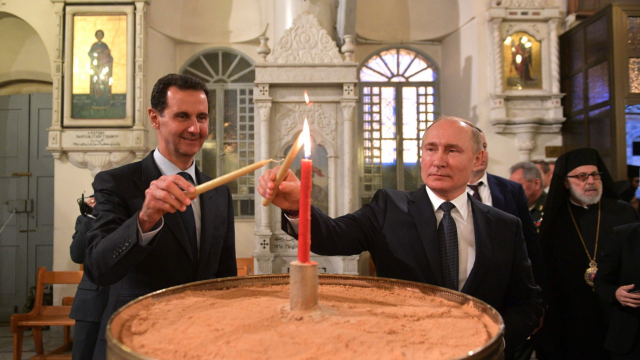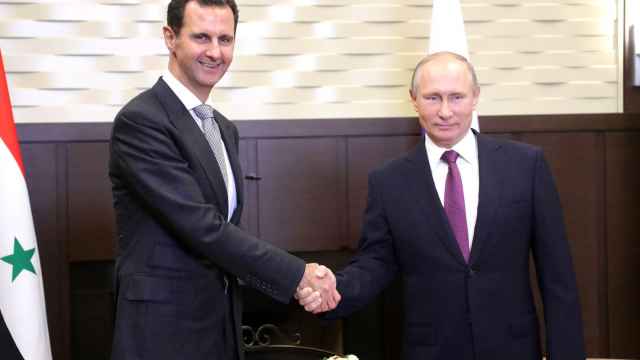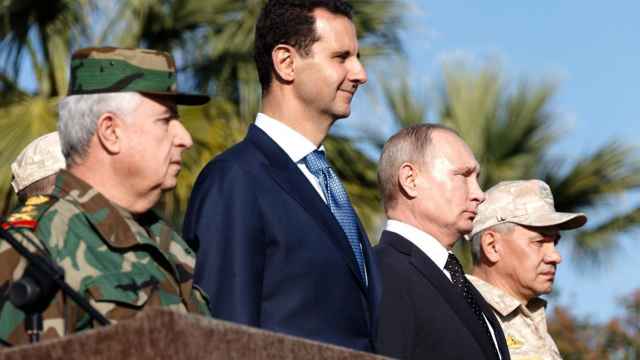(Bloomberg) — The Russian Defense Ministry is denying a report by a leading Moscow newspaper that seven Russian warplanes were destroyed in a New Year's Eve attack on the Khmeimim air base in Syria. Two Russian servicemen died in the attack, according to the ministry.
Clearly, fighting in Syria isn't over for Russia yet, despite President Vladimir Putin's self-congratulatory conversations with Syrian ally Bashar al-Assad.
Recently, however, General Valery Gerasimov, head of Russia's General Staff, made public his post-mortem of the Syrian operation, revealing Russia's military priorities in Syria and its persistent conviction that every conflict in which it is involved is a proxy war against the U.S.
That war won't be over even once Syrian violence subsides. In the interview with pro-Kremlin daily Komsomolskaya Pravda, Gerasimov provides the basis for Putin's claims that Russia has defeated ISIS.
These claims, of course, compete with those of U.S. President Donald Trump, who has said the victory was his, and those of former U.S. Secretary of Defense Ash Carter, who claims in a recent memoir that Russia was merely a "spoiler" of a winning strategy Carter had devised.
Though neither Russia nor the U.S. can credibly claim a full victory, the current map of Syria leans toward the Russian version: The Assad regime controls most of the country's territory, an amazing achievement after barely holding on to 10 percent of it in the summer of 2015.
Both great military powers used similar strategies, refusing to put boots on the ground in a major way and relying instead on local forces to do the fighting. "'Lasting defeat required enabling local forces to reclaim territory from ISIS and hold it rather than attempting to substitute for them," Carter wrote.
"That meant focusing U.S. forces on training, equipping, enabling, and often accompanying them." It worked only partially for the U.S. -- mainly to the extent that it helped Kurdish fighters, who now control Syria's northern and northeastern areas.
Gerasimov, for his part, said Russia focused on assisting the demoralized, fatigued Syrian regime army: "We helped them, repaired their equipment right there on the ground. Today, the Syrian army is ready to defend its territory."
Both Russia and the U.S. claim they fought ISIS rather than pursued political goals. But U.S. officials have long claimed that Russian bombing raids targeted anti-Assad rebel groups rather than Islamic State terrorists. In his interview, Gerasimov counters that claim by comparing airstrike numbers:
"Look, all this time the international coalition delivered eight to 10 airstrikes a day. Our aviation, with a rather insignificant force, delivered 60 to 70 airstrikes a day on militants, on infrastructure, on their bases. At times of the highest tension it was 120 to 140 strikes per day. That was the only way to break international terrorism's back in Syria. As for eight to 10 strikes a day... Well, perhaps the coalition's goals were different. The goal they mainly set for themselves was to fight Assad, not ISIS."
In reality, though, it would be fairer to say that both Russia and the U.S. pursued multiple goals in Syria.
In the final stage of the conflict, it became more important for the U.S. to defeat ISIS than to displace Assad: It was a major domestic political issue because of ISIS-inspired terror attacks in Europe and in the U.S. itself.
For Russia, both defending the Syrian dictator as a reliable ally and beating ISIS apparently played second fiddle to the goal of battle-testing its recently reformed and rearmed military. Gerasimov's interview reveals a hunger to put as many people and systems as possible to the test in this one conflict.
According to Gerasimov, the only previous time Russia had to deploy troops so far from its borders was to Cuba in 1962, so it was important to test that capability. The general says Russia ran 48,000 service members through the Syrian war theater. "The main thing was to test the commanders, the officers," Gerasimov told Komsomolskaya Pravda. "We had all the commanders of the military districts spend quite a long time there."
That explains why Russia rotated the Syrian operation's commander so often, using five generals to run the military action between September, 2015 and the end of 2017. According to Gerasimov, the command structures of 90 percent of Russian divisions and more than half of regiments and brigades underwent battle testing. Officers were sent to Syria on a three-month rotation plan, and Gerasimov had high praise for their performance.
"This means the whole system of combat training for troops and command structures works, people are ready to perform their tasks," he said.
Russia also managed to test more than 200 types of weapons that the Russian military had recently adopted or was about to adopt. The designers of the weapons systems were sent to Syria to oversee how their products worked. Among other things, the Syrian conflict provided Russia with its greatest opportunity so far to deploy drones — up to 60 of them a day were in the air, Gerasimov boasted.
"Today, an absolute majority of the glitches have been fixed," Gerasimov said. "That we have tested equipment and weapons under combat conditions is huge. Now, we're confident in our weapons."
Something Gerasimov doesn't say is that Russia also tested a private military company based in southern Russia, Wagner, which provided critical ground support to Assad's forces and, according to independent research, bore the brunt of the losses.
The mercenaries weren't invited to the Kremlin to receive medals for Syria, but they are a mainstay of Russia's modern military strategy and a big help in deflecting the political fallout that usually comes with military casualties.
There's a second reason the testing aspect of the campaign was so important for Russia: In their minds, its soldiers are pitting themselves against the West.
At the Kremlin award ceremony, Major Maxim Makolkin, a pilot who received an Order of Courage, proudly told Putin: "When we met in the air with our partners from the Western coalition, we always found ourselves, as pilots say, on their tail, and that would have meant victory in a real fight."
In the same vein, Gerasimov provides a detailed description of a minor incident involving U.S. and Russian aircraft on the agreed separation line between the two air forces. He accuses the U.S. of being unwilling to cooperate with Russia even to speed up the defeat of ISIS -- a claim directly confirmed by Carter in his memoir.
Gerasimov accuses the U.S. of maintaining bases in Syria now to "repurpose" former ISIS fighters as anti-Assad ones to "destabilize the situation." One reason Russia is maintaining a military presence in Syria despite Putin's repeated claims of withdrawal is to counter this "destabilization."
Any military decisions Russia makes these days are made with an eye to a barely concealed conflict with the U.S. That's how the Kremlin and the Russian generals see the eastern Ukraine conflict, in which U.S. weaponry may soon be used, and, to a large extent, the Syrian one.
A Message from The Moscow Times:
Dear readers,
We are facing unprecedented challenges. Russia's Prosecutor General's Office has designated The Moscow Times as an "undesirable" organization, criminalizing our work and putting our staff at risk of prosecution. This follows our earlier unjust labeling as a "foreign agent."
These actions are direct attempts to silence independent journalism in Russia. The authorities claim our work "discredits the decisions of the Russian leadership." We see things differently: we strive to provide accurate, unbiased reporting on Russia.
We, the journalists of The Moscow Times, refuse to be silenced. But to continue our work, we need your help.
Your support, no matter how small, makes a world of difference. If you can, please support us monthly starting from just $2. It's quick to set up, and every contribution makes a significant impact.
By supporting The Moscow Times, you're defending open, independent journalism in the face of repression. Thank you for standing with us.
Remind me later.



